人教版(2019)选择性必修第一册unit4 Body Language复习课件(50张ppt)
文档属性
| 名称 | 人教版(2019)选择性必修第一册unit4 Body Language复习课件(50张ppt) | 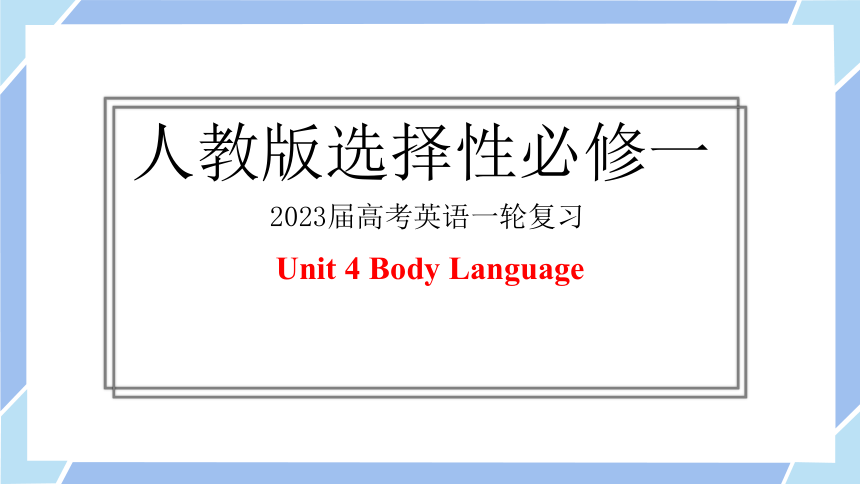 | |
| 格式 | zip | ||
| 文件大小 | 180.5KB | ||
| 资源类型 | 教案 | ||
| 版本资源 | 人教版(2019) | ||
| 科目 | 英语 | ||
| 更新时间 | 2022-12-11 15:20:35 | ||
图片预览

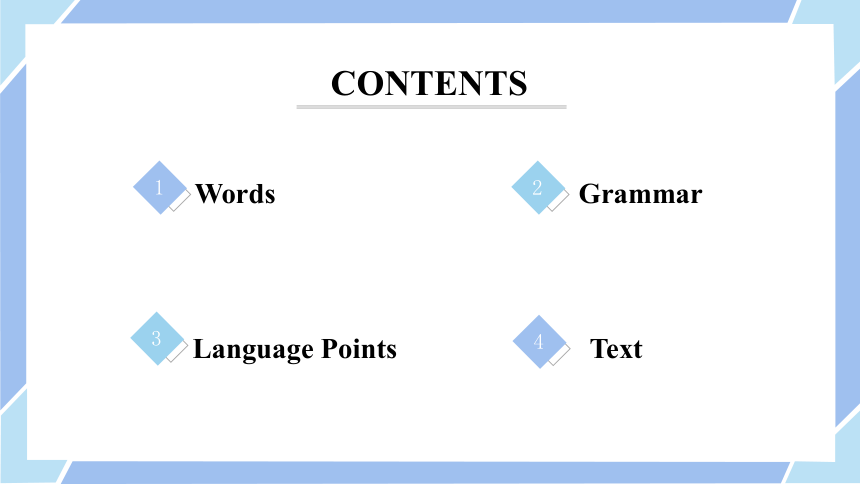
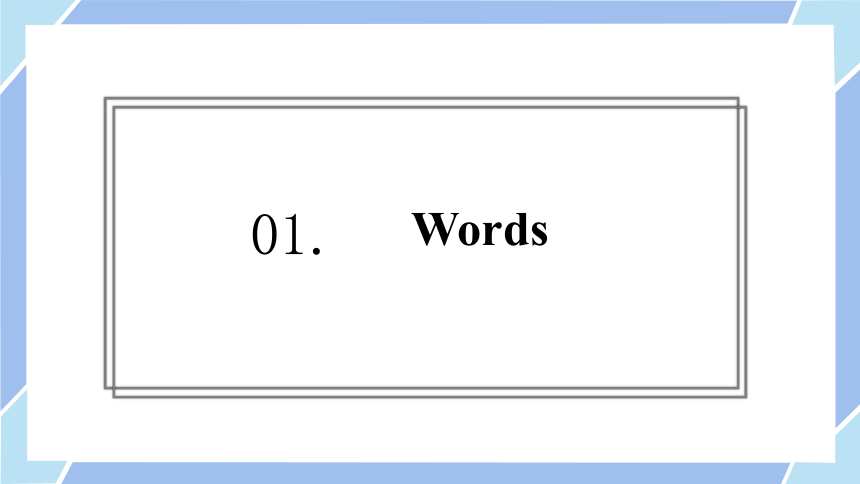
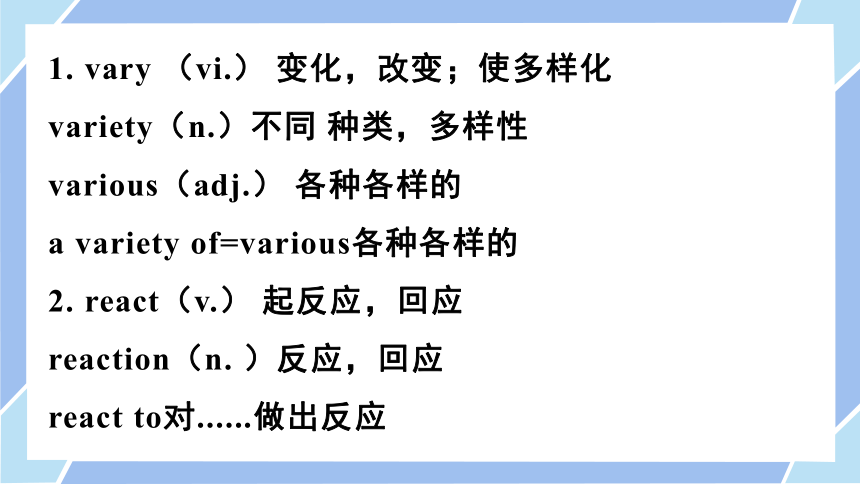
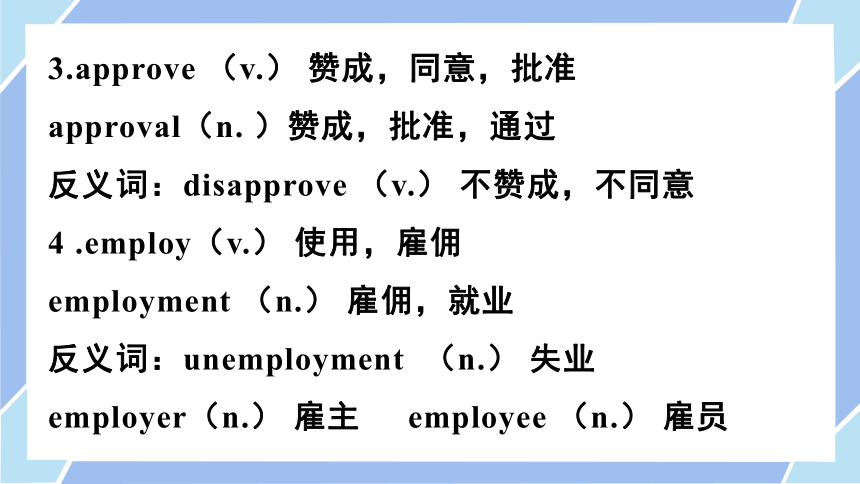
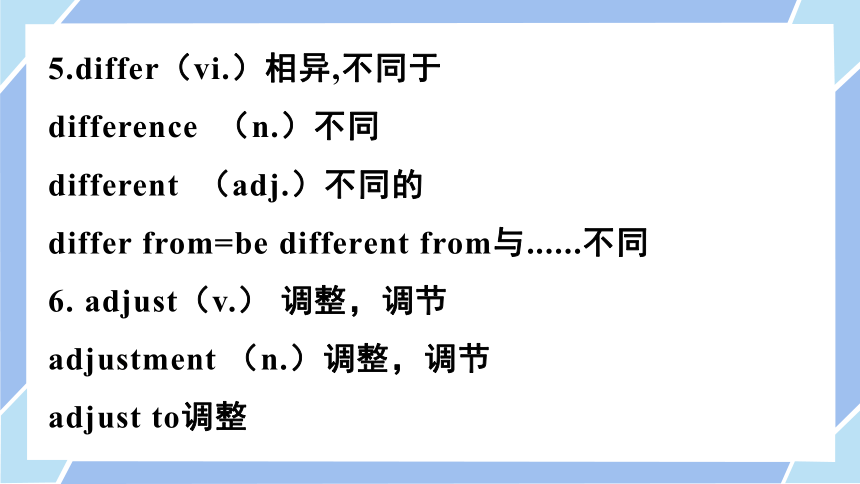
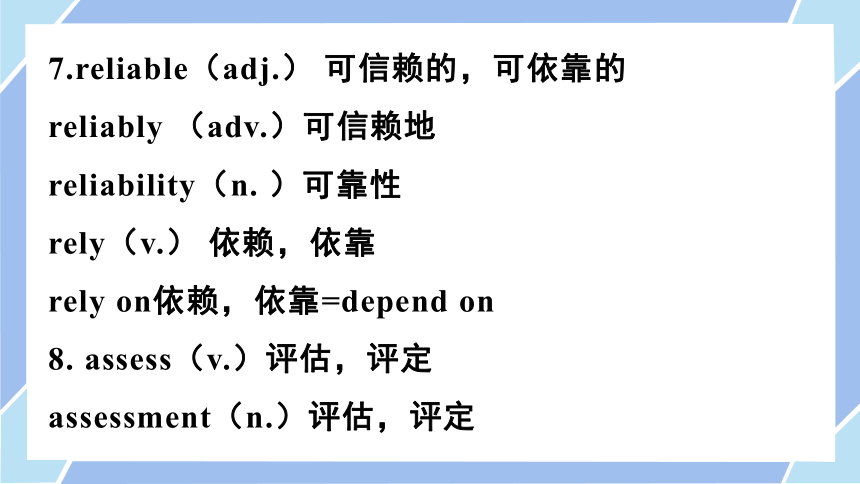
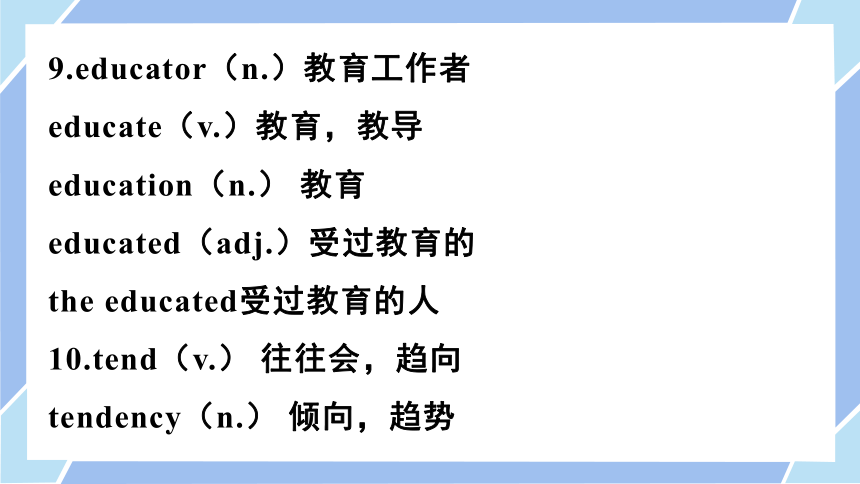
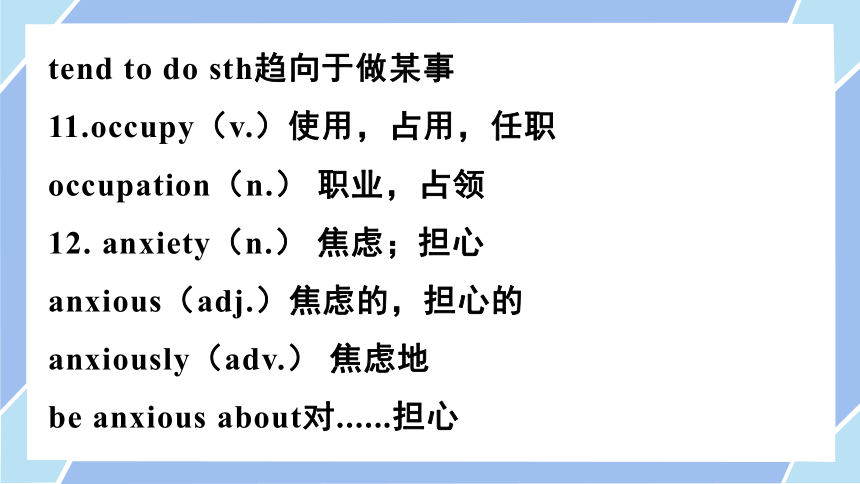
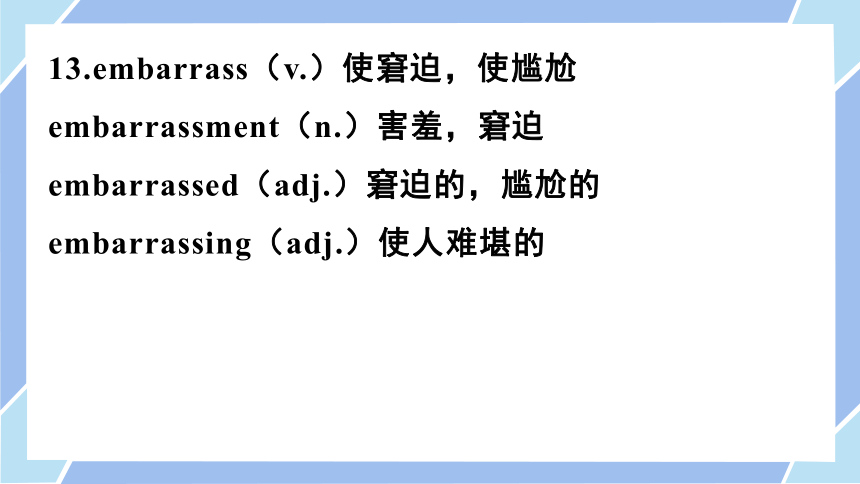
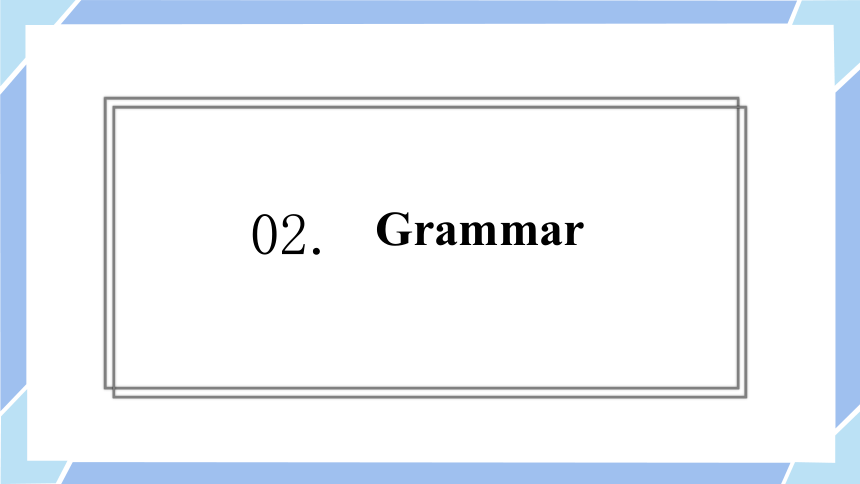
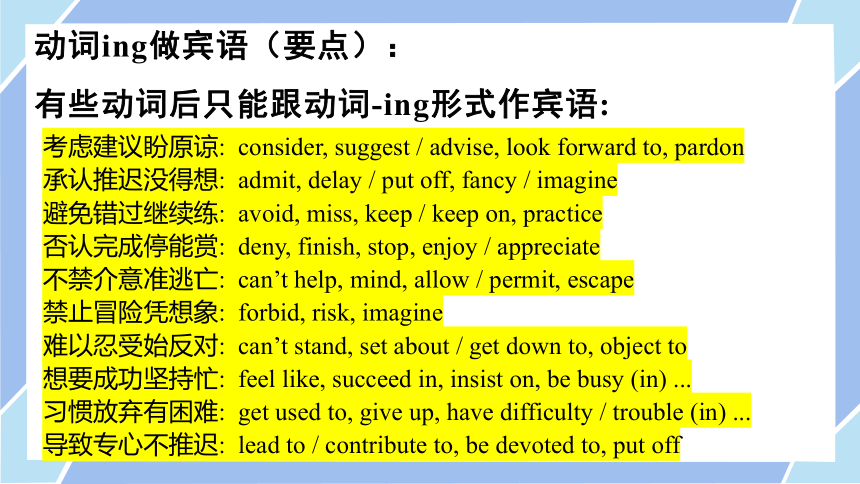
文档简介
(共50张PPT)
人教版选择性必修一
Unit 4 Body Language
2023届高考英语一轮复习
CONTENTS
Grammar
Text
Language Points
Words
1
3
4
2
01.
Words
1. vary (vi.) 变化,改变;使多样化
variety(n.)不同 种类,多样性
various(adj.) 各种各样的
a variety of=various各种各样的
2. react(v.) 起反应,回应
reaction(n. )反应,回应
react to对......做出反应
3.approve (v.) 赞成,同意,批准
approval(n. )赞成,批准,通过
反义词:disapprove (v.) 不赞成,不同意4 .employ(v.) 使用,雇佣
employment (n.) 雇佣,就业
反义词:unemployment (n.) 失业
employer(n.) 雇主 employee (n.) 雇员
5.differ(vi.)相异,不同于
difference (n.)不同
different (adj.)不同的
differ from=be different from与......不同
6. adjust(v.) 调整,调节
adjustment (n.)调整,调节
adjust to调整
7.reliable(adj.) 可信赖的,可依靠的
reliably (adv.)可信赖地
reliability(n. )可靠性
rely(v.) 依赖,依靠
rely on依赖,依靠=depend on
8. assess(v.)评估,评定
assessment(n.)评估,评定
9.educator(n.)教育工作者
educate(v.)教育,教导
education(n.) 教育
educated(adj.)受过教育的
the educated受过教育的人
10.tend(v.) 往往会,趋向
tendency(n.) 倾向,趋势
tend to do sth趋向于做某事
11.occupy(v.)使用,占用,任职
occupation(n.) 职业,占领
12. anxiety(n.) 焦虑;担心
anxious(adj.)焦虑的,担心的
anxiously(adv.) 焦虑地
be anxious about对......担心
13.embarrass(v.)使窘迫,使尴尬
embarrassment(n.)害羞,窘迫
embarrassed(adj.)窘迫的,尴尬的
embarrassing(adj.)使人难堪的
02.
Grammar
动词ing做宾语(要点):
有些动词后只能跟动词-ing形式作宾语:
考虑建议盼原谅: consider, suggest / advise, look forward to, pardon
承认推迟没得想: admit, delay / put off, fancy / imagine
避免错过继续练: avoid, miss, keep / keep on, practice
否认完成停能赏: deny, finish, stop, enjoy / appreciate
不禁介意准逃亡: can’t help, mind, allow / permit, escape
禁止冒险凭想象: forbid, risk, imagine
难以忍受始反对: can’t stand, set about / get down to, object to
想要成功坚持忙: feel like, succeed in, insist on, be busy (in) ...
习惯放弃有困难: get used to, give up, have difficulty / trouble (in) ...
导致专心不推迟: lead to / contribute to, be devoted to, put off
动词ing做宾语(要点):
以下结构中,动词-ing形式作介词的宾语,介词常省略:
spend...(in) doing sth.花费……做某事
have difficulty/trouble (in) doing...做……有困难
stop/prevent...(from) doing sth.阻止……做某事
waste time (in) doing sth.浪费时间做某事
动词ing做宾语(要点):
以下结构中,动词-ing形式作介词的宾语,介词常省略:
be busy (in) doing sth.忙于做某事
have a good/hard time (in) doing sth.高兴做某事/费了很大劲做某事
there is no point (in) doing sth.做某事毫无意义
动词ing做宾语(要点):
有些动词后既可跟动词-ing形式作宾语, 也可跟动词不定式作宾语:
动词-ing To do
Like, love, hate prefer 泛指的动作 具体的一次性动作
Begin, start, continue 意义无区别 Forget,remember, regret 已经发生的动作 将要发生的动作
动词ing做宾语(要点):
初中时候再熟悉不过的短语: stop to do和stop doing
注意区分:mean doing 意味着要做某事
mean to do 想要做某事
be used to doing 习惯于做某事
be used to do 被用来做某事
can't help doing 禁不住做某事
can't help to do 不能帮助做某事
动词ing做宾语(要点):
The -ing form 作介词的宾语时需要注意: be / get used to等中的 to 都是介词,不是不定式符号to do。
常见的带介词 to 的短语:
object to(反对)
devote oneself to(献身于)
keep to(坚持)
contribute to(有助于)
be / get used to(习惯于)
look forward to(盼望)
get down to(着手做)
admit to(承认)
lead to(导致)
be equal to(胜任的)
stick to(忠于、坚持)
pay attention to(注意)
be addicted to(沉溺于)
动词ing做宾语(要点):
The -ing form 在少数表“需要”的动词 (如 want, need, require, deserve, desire 等) 后表示被动意义。
1. The carpet really wants _________ (clean).
2. The road needs _________ (repair).
3. Her plan deserves ___________ (consider).
4. The plants require _________ (water) every day.
特别注意:sth need / require / deserve / want / desire + doing
= sth need / require / deserve / want / desire + to be done
cleaning
repairing
considering
watering
动词ing做宾语(要点):
ing的变化形式(经常错):
The -ing form 形式 主动 被动
一般式
完成式
(not) being done
(not) having done
(not) doing
(not) having been done
动词ing做表语(要点):
表语是啥?
说明名词的特征
系动词:
(1)be动词:am, is, are, was, were
(2)感官动词:look, smell, sound, taste, feel
(3)变化动词:become, get, go, grow, turn
(+adj. 译为“变得”)
动词ing做表语(要点):
系动词:
(4)保持:keep, stay, remain
(+adj. 译为“保持”)
(5)无实义动词:seem, prove, appear
(+adj. 无实际含义,功能类比be动词)
动词-ing形式作表语,说明主语的内容,指一般性、经常性的动作。
My mother’s hobby is growing vegetable.
动词ing做表语(要点):
现在分词作表语,总是跟在系动词之后,表示主语所具有的特征。
The development of plane is quite encouraging.
常见现在分词:
amazing, amusing, annoying, astonishing, boring, charming, encouraging
基本上,现在分词已经形容词化
03.
Language Points
vary from...to...在……到……之间变化;从……到……不等
vary in sth. 在某方面不同
vary with...随……而变化
a variety of=varieties of=various多种多样的
vi.(根据情况)变化;改变(various adj.不同的;各种各样的 variety n.多样性;变化;种类)
1
vary
(1)In our daily life,we will come across (vary) barriers,so we should try to break them down.
(2)In my class the students vary height 100 cm to 120 cm.
various
in
from
(3)文学社推荐了各种各样的好书,鼓励我们从阅读中获得乐趣。
The Literature Society ___________________________________________
___________,encouraging us to get pleasure out of reading.
(4)我有许多爱好,从打篮球到弹钢琴不等。
①I have a number of hobbies,___________________________________
__________________.(定语从句)
②I have a number of hobbies,___________________________________
__________.(非谓语动词)
recommended a variety of/varieties of/various
good books
which vary from playing basketball to
playing the piano
varying from playing basketball to playing
the piano
approve of赞成,同意
approve sth. 批准某事
give one’s approval to sth. 批准某事
vi.赞成,同意 vt.批准;通过(approval n.赞成;通过;同意;认可;批准 approving adj.赞许的;许可的)
2
approve
(1)Almost all the educators gave us an (approve) nod to our plan.
approving
(2)如果您能批准我们的提议,我们将不胜感激。(应用文写作之感谢信)
①We would be grateful .(approve)
②We would be grateful________________________________________.
(approval)
(3)既然您赞成我的主意,我就详细地向您介绍一下。
,I will introduce it to you in detail.
if you could approve our proposal
if you could give approval to our proposal
Now that you have approved of my idea
favour sth. /doing sth. 较喜欢某事/做某事
ask sb. a favour=ask a favour of sb. 求某人帮一个忙
do a favour for sb. =do sb. a favour帮某人一个忙
owe sb. a favour欠某人的人情
in favour of赞成;支持
in sb. ’s favour对某人有利
vt.较喜欢;选择;有利于 n.帮助;恩惠;赞同(favourable adj.赞成的;有利的)
3
favour
(1)By performing appropriate measures,we have created a (favor) learning environment.
(2)He boiled with anger when hearing that most of them weren’t ___favour of his opinion.
(3)When I take photos,I favour (pose) in this way for a photograph.
(4)我写这封信,希望你能够在即将到来的面试中帮助我。(应用文写作之求助信)
I’m writing this letter,hoping that_______________________________
______________________________.
favourable
posing
in
you can do me a favour/do a favour
for me with my coming interview
occupy sb. /oneself with sth. /in doing sth. 忙于做某事;专心做某事
be occupied with sth. /in doing sth. 忙于做某事
vt.占用;占领;占据(occupied adj.使用中;忙于;被占领的 occupation n.占领;职业)
4
occupy
(1)Ultimately,you must state your full name,age and____________(occupy)
in your application form.
occupation
(2)Because they were occupied in making and selling popcorn,they spared no time to play around.(2020·新高考全国Ⅰ,读后续写)
→ ,they spared no time to play around.(用现在分词短语作状语改写)
→ ,they spared no time to play around.(用过去分词短语作状语改写)
Occupying themselves in making and selling popcorn
Occupied in making and selling popcorn
adj.羞愧;惭愧(shame n.羞耻;羞愧;让人遗憾的事 shameful adj.可耻的 shameless adj.无耻的;没廉耻的)
5
ashamed
be/feel ashamed of...为……而感到羞耻
be ashamed to do sth. 羞于/耻于做某事
It’s a shame that...……真让人遗憾。
What a shame/pity!真遗憾!
(1)It’s (shame) to apply other people’s research results without their permission.
(2)She was ashamed making so many conflicts with her classmate Tom.
shameful
of
(3)It is shame that my plan hasn’t been approved.
(4)我是如此羞愧,以至于我感觉心如刀绞,眼泪模糊了我的双眼。(读后续写之羞愧心理描写)
①I was that I felt as if a knife were piercing(刺穿) my heart,tears clouding my eyes.(用so...that...句型)
② I felt as if a knife were piercing my heart,tears clouding my eyes.(用so...that...句型的倒装形式改写)
a
so ashamed
So ashamed was I that
adjust (oneself) to (doing)...适应……;习惯……
adjust...to...调整……以适应……
make an adjustment/adjustments作出调整
vt.调整;调节 vi.& vt.适应;(使)习惯(adjustment n.调整;适应 adjustable adj.可调节的;可调整的)
6
adjust
(1)To my great joy,the height of the bicycle is (adjust).
(2)我写信向您寻求一些如何适应新环境的建议。(应用文写作之求助信)
I am writing to ask you for some advice on__________________________
_________________.
adjustable
how to adjust (myself) to the
new surroundings
(3)由于我没有及时调整相关的信息,这给您带来极大的不便,我写信向您道歉。(应用文写作之道歉信)
①I am writing to apologize to you for _____________________________
___________________,causing great inconvenience to you.(adjust)
②I am writing to apologize to you for _____________________________
__________________________, great inconvenience to you.(adjustment,定语从句)
my not adjusting the relevant
information in time
my not making adjustments to the
relevant information in time
which caused
break away (from)离开;脱离
break in(不及物)插嘴;闯入
break into(及物)闯入;突然……起来
break out爆发
break up分散;拆散;驱散;分手
break through突破;克服
分解;(机器)损坏,出故障;(谈判)失败;(身体)垮掉;消除;打破
7
break down
用break的相关短语填空
(1)What angered me was that my car on the way to my company.
(2)We arrived home early only to find a thief trying to .
(3)The president’s tone implied that a war would soon.
(4)When the father saw his lost child safe,he tears and his anxiety finally disappeared.
(5)The boy and the girl had serious conflicts,so they .
(6)The educator hasn’t in his teaching so far.
broke down
break in
break out
broke into
broke up
broken through
call up给……打电话;(使)想起
call off=cancel取消
call for(公开)要求;需要
call in打电话来;召来,叫来;收回
call at sp. 拜访(地点)
访问;要求;正式邀请;呼吁;号召
8
call on
用call的相关短语填空
(1)I stared at the picture,which memories of our class trip.
(2)Now the government us to download relevant information from reliable websites.
(3)The conference had been ultimately ,so we went home instead.
(4)Sometimes situations us to be strong and brave.
called up
calls on
called off
call for
部分否定:当all,both,each,everybody,everyone,everything,
always,whole,entirely等具有总括意义的代词、形容词和副词与否定
副词not连用时,构成了部分否定,意为“不是……都;并非……都”。
全部否定:neither,no one,no,none,never,nothing,no more,
no longer,no way,not...any等表示否定意义的词(组)与肯定式谓语一
起使用时,构成“全部否定”。
Of course,not everyone who looks up is paying attention in class. 当然,并不是每个抬头的人都专注于课堂。
9
部分否定
写作常用谚语:
All that glisters is not gold.闪光的并不总是金子
=All is not gold that glitters.
(1)我同意你说的大部分内容,但并非同意你讲的一切。
I agree with most of what you said,but ___________________________
that you said.
(2)汤姆让杰克和彼得陪他去野餐,但是他们两个都不想去,因为他们有工作要做。
Tom asks Jack and Peter to go on a picnic with him,but _____________
___________,because they have work to do.
(3)他被授予这次比赛的一等奖,尽管似乎不是所有人都同意。
He was awarded the first prize in the competition,though____________
_____________________.
I don’t agree with everything
neither of them
want(s) to
not all of the
people seemed to agree
补充语言点:定语从句the way后三种情况:(常考)
省略/in which/that
1. I don’t like the way _________________ he speaks to me.
2. I want to know the way _______________ he told you yesterday.
3. He has given you the way ___________ is best to solve the problem.
that / in which / 省略
that / which / 省略
that / which
补充语言点:在“have + 宾语 + 宾补”结构中,宾补可以是省略 to 的不定式、现在分词和过去分词。其中的 have 为使役动词。
have + O + do 表示:叫(请、使、让)某人做某事。
have + O + doing 表示:使(让)某人(某事物)一直做某事或处于做某事的状态之中。
have + O + done 表示:
① 主动地完成某动作或解决某事。
② 表示请(让)别人做某事。
③ 表示经历或遭遇某情况。
1. 我们现在已经把这个问题解决了。
2. 他弄得我们整顿午餐时间笑声不停。
3. 我会让约翰带你参观这个城市。
We now have the problem solved.
He had us laughing all through the lunch.
I’ll have John show you around the city.
练习
04.
Text
1 vary from ... to ...
2 be appropriate to
3 make eye contact
4 by contrast
5 by comparison
6 make inferences
7 get through
对……恰当的
目光接触
对比起来;相比之下
相比较起来
(使)通过;到达;(使)熬过;(打电话时)打通
从……变化到……
推论;推断
课文1重点:
课文1重点:
8 break down
9 feel down
10 apart from
11 refer to
12 display interest in
13 in favour of
14 make assessments
15 be likely to
参考;查阅;提到
对……表现出兴趣
支持;赞成
除了
评估
可能
感到沮丧
(机器等)出故障;打破 / 消除;把……分成若干部分;使分解
课文2重点:
1 one-on-one conversations
2 make a joke
3 have a tendency to do sth
4 call on
5 at work
6 have conflicts with
7 react to
8 be robbed of
一对一的谈话
有做某事的倾向
拜访;号召;要求(某人讲话等)
在运转;有某种影响;起某种作用
与……有冲突
对……作出反应
被抢走
开玩笑
Thanks for your listening!
人教版选择性必修一
2023届高考英语一轮复习
人教版选择性必修一
Unit 4 Body Language
2023届高考英语一轮复习
CONTENTS
Grammar
Text
Language Points
Words
1
3
4
2
01.
Words
1. vary (vi.) 变化,改变;使多样化
variety(n.)不同 种类,多样性
various(adj.) 各种各样的
a variety of=various各种各样的
2. react(v.) 起反应,回应
reaction(n. )反应,回应
react to对......做出反应
3.approve (v.) 赞成,同意,批准
approval(n. )赞成,批准,通过
反义词:disapprove (v.) 不赞成,不同意4 .employ(v.) 使用,雇佣
employment (n.) 雇佣,就业
反义词:unemployment (n.) 失业
employer(n.) 雇主 employee (n.) 雇员
5.differ(vi.)相异,不同于
difference (n.)不同
different (adj.)不同的
differ from=be different from与......不同
6. adjust(v.) 调整,调节
adjustment (n.)调整,调节
adjust to调整
7.reliable(adj.) 可信赖的,可依靠的
reliably (adv.)可信赖地
reliability(n. )可靠性
rely(v.) 依赖,依靠
rely on依赖,依靠=depend on
8. assess(v.)评估,评定
assessment(n.)评估,评定
9.educator(n.)教育工作者
educate(v.)教育,教导
education(n.) 教育
educated(adj.)受过教育的
the educated受过教育的人
10.tend(v.) 往往会,趋向
tendency(n.) 倾向,趋势
tend to do sth趋向于做某事
11.occupy(v.)使用,占用,任职
occupation(n.) 职业,占领
12. anxiety(n.) 焦虑;担心
anxious(adj.)焦虑的,担心的
anxiously(adv.) 焦虑地
be anxious about对......担心
13.embarrass(v.)使窘迫,使尴尬
embarrassment(n.)害羞,窘迫
embarrassed(adj.)窘迫的,尴尬的
embarrassing(adj.)使人难堪的
02.
Grammar
动词ing做宾语(要点):
有些动词后只能跟动词-ing形式作宾语:
考虑建议盼原谅: consider, suggest / advise, look forward to, pardon
承认推迟没得想: admit, delay / put off, fancy / imagine
避免错过继续练: avoid, miss, keep / keep on, practice
否认完成停能赏: deny, finish, stop, enjoy / appreciate
不禁介意准逃亡: can’t help, mind, allow / permit, escape
禁止冒险凭想象: forbid, risk, imagine
难以忍受始反对: can’t stand, set about / get down to, object to
想要成功坚持忙: feel like, succeed in, insist on, be busy (in) ...
习惯放弃有困难: get used to, give up, have difficulty / trouble (in) ...
导致专心不推迟: lead to / contribute to, be devoted to, put off
动词ing做宾语(要点):
以下结构中,动词-ing形式作介词的宾语,介词常省略:
spend...(in) doing sth.花费……做某事
have difficulty/trouble (in) doing...做……有困难
stop/prevent...(from) doing sth.阻止……做某事
waste time (in) doing sth.浪费时间做某事
动词ing做宾语(要点):
以下结构中,动词-ing形式作介词的宾语,介词常省略:
be busy (in) doing sth.忙于做某事
have a good/hard time (in) doing sth.高兴做某事/费了很大劲做某事
there is no point (in) doing sth.做某事毫无意义
动词ing做宾语(要点):
有些动词后既可跟动词-ing形式作宾语, 也可跟动词不定式作宾语:
动词-ing To do
Like, love, hate prefer 泛指的动作 具体的一次性动作
Begin, start, continue 意义无区别 Forget,remember, regret 已经发生的动作 将要发生的动作
动词ing做宾语(要点):
初中时候再熟悉不过的短语: stop to do和stop doing
注意区分:mean doing 意味着要做某事
mean to do 想要做某事
be used to doing 习惯于做某事
be used to do 被用来做某事
can't help doing 禁不住做某事
can't help to do 不能帮助做某事
动词ing做宾语(要点):
The -ing form 作介词的宾语时需要注意: be / get used to等中的 to 都是介词,不是不定式符号to do。
常见的带介词 to 的短语:
object to(反对)
devote oneself to(献身于)
keep to(坚持)
contribute to(有助于)
be / get used to(习惯于)
look forward to(盼望)
get down to(着手做)
admit to(承认)
lead to(导致)
be equal to(胜任的)
stick to(忠于、坚持)
pay attention to(注意)
be addicted to(沉溺于)
动词ing做宾语(要点):
The -ing form 在少数表“需要”的动词 (如 want, need, require, deserve, desire 等) 后表示被动意义。
1. The carpet really wants _________ (clean).
2. The road needs _________ (repair).
3. Her plan deserves ___________ (consider).
4. The plants require _________ (water) every day.
特别注意:sth need / require / deserve / want / desire + doing
= sth need / require / deserve / want / desire + to be done
cleaning
repairing
considering
watering
动词ing做宾语(要点):
ing的变化形式(经常错):
The -ing form 形式 主动 被动
一般式
完成式
(not) being done
(not) having done
(not) doing
(not) having been done
动词ing做表语(要点):
表语是啥?
说明名词的特征
系动词:
(1)be动词:am, is, are, was, were
(2)感官动词:look, smell, sound, taste, feel
(3)变化动词:become, get, go, grow, turn
(+adj. 译为“变得”)
动词ing做表语(要点):
系动词:
(4)保持:keep, stay, remain
(+adj. 译为“保持”)
(5)无实义动词:seem, prove, appear
(+adj. 无实际含义,功能类比be动词)
动词-ing形式作表语,说明主语的内容,指一般性、经常性的动作。
My mother’s hobby is growing vegetable.
动词ing做表语(要点):
现在分词作表语,总是跟在系动词之后,表示主语所具有的特征。
The development of plane is quite encouraging.
常见现在分词:
amazing, amusing, annoying, astonishing, boring, charming, encouraging
基本上,现在分词已经形容词化
03.
Language Points
vary from...to...在……到……之间变化;从……到……不等
vary in sth. 在某方面不同
vary with...随……而变化
a variety of=varieties of=various多种多样的
vi.(根据情况)变化;改变(various adj.不同的;各种各样的 variety n.多样性;变化;种类)
1
vary
(1)In our daily life,we will come across (vary) barriers,so we should try to break them down.
(2)In my class the students vary height 100 cm to 120 cm.
various
in
from
(3)文学社推荐了各种各样的好书,鼓励我们从阅读中获得乐趣。
The Literature Society ___________________________________________
___________,encouraging us to get pleasure out of reading.
(4)我有许多爱好,从打篮球到弹钢琴不等。
①I have a number of hobbies,___________________________________
__________________.(定语从句)
②I have a number of hobbies,___________________________________
__________.(非谓语动词)
recommended a variety of/varieties of/various
good books
which vary from playing basketball to
playing the piano
varying from playing basketball to playing
the piano
approve of赞成,同意
approve sth. 批准某事
give one’s approval to sth. 批准某事
vi.赞成,同意 vt.批准;通过(approval n.赞成;通过;同意;认可;批准 approving adj.赞许的;许可的)
2
approve
(1)Almost all the educators gave us an (approve) nod to our plan.
approving
(2)如果您能批准我们的提议,我们将不胜感激。(应用文写作之感谢信)
①We would be grateful .(approve)
②We would be grateful________________________________________.
(approval)
(3)既然您赞成我的主意,我就详细地向您介绍一下。
,I will introduce it to you in detail.
if you could approve our proposal
if you could give approval to our proposal
Now that you have approved of my idea
favour sth. /doing sth. 较喜欢某事/做某事
ask sb. a favour=ask a favour of sb. 求某人帮一个忙
do a favour for sb. =do sb. a favour帮某人一个忙
owe sb. a favour欠某人的人情
in favour of赞成;支持
in sb. ’s favour对某人有利
vt.较喜欢;选择;有利于 n.帮助;恩惠;赞同(favourable adj.赞成的;有利的)
3
favour
(1)By performing appropriate measures,we have created a (favor) learning environment.
(2)He boiled with anger when hearing that most of them weren’t ___favour of his opinion.
(3)When I take photos,I favour (pose) in this way for a photograph.
(4)我写这封信,希望你能够在即将到来的面试中帮助我。(应用文写作之求助信)
I’m writing this letter,hoping that_______________________________
______________________________.
favourable
posing
in
you can do me a favour/do a favour
for me with my coming interview
occupy sb. /oneself with sth. /in doing sth. 忙于做某事;专心做某事
be occupied with sth. /in doing sth. 忙于做某事
vt.占用;占领;占据(occupied adj.使用中;忙于;被占领的 occupation n.占领;职业)
4
occupy
(1)Ultimately,you must state your full name,age and____________(occupy)
in your application form.
occupation
(2)Because they were occupied in making and selling popcorn,they spared no time to play around.(2020·新高考全国Ⅰ,读后续写)
→ ,they spared no time to play around.(用现在分词短语作状语改写)
→ ,they spared no time to play around.(用过去分词短语作状语改写)
Occupying themselves in making and selling popcorn
Occupied in making and selling popcorn
adj.羞愧;惭愧(shame n.羞耻;羞愧;让人遗憾的事 shameful adj.可耻的 shameless adj.无耻的;没廉耻的)
5
ashamed
be/feel ashamed of...为……而感到羞耻
be ashamed to do sth. 羞于/耻于做某事
It’s a shame that...……真让人遗憾。
What a shame/pity!真遗憾!
(1)It’s (shame) to apply other people’s research results without their permission.
(2)She was ashamed making so many conflicts with her classmate Tom.
shameful
of
(3)It is shame that my plan hasn’t been approved.
(4)我是如此羞愧,以至于我感觉心如刀绞,眼泪模糊了我的双眼。(读后续写之羞愧心理描写)
①I was that I felt as if a knife were piercing(刺穿) my heart,tears clouding my eyes.(用so...that...句型)
② I felt as if a knife were piercing my heart,tears clouding my eyes.(用so...that...句型的倒装形式改写)
a
so ashamed
So ashamed was I that
adjust (oneself) to (doing)...适应……;习惯……
adjust...to...调整……以适应……
make an adjustment/adjustments作出调整
vt.调整;调节 vi.& vt.适应;(使)习惯(adjustment n.调整;适应 adjustable adj.可调节的;可调整的)
6
adjust
(1)To my great joy,the height of the bicycle is (adjust).
(2)我写信向您寻求一些如何适应新环境的建议。(应用文写作之求助信)
I am writing to ask you for some advice on__________________________
_________________.
adjustable
how to adjust (myself) to the
new surroundings
(3)由于我没有及时调整相关的信息,这给您带来极大的不便,我写信向您道歉。(应用文写作之道歉信)
①I am writing to apologize to you for _____________________________
___________________,causing great inconvenience to you.(adjust)
②I am writing to apologize to you for _____________________________
__________________________, great inconvenience to you.(adjustment,定语从句)
my not adjusting the relevant
information in time
my not making adjustments to the
relevant information in time
which caused
break away (from)离开;脱离
break in(不及物)插嘴;闯入
break into(及物)闯入;突然……起来
break out爆发
break up分散;拆散;驱散;分手
break through突破;克服
分解;(机器)损坏,出故障;(谈判)失败;(身体)垮掉;消除;打破
7
break down
用break的相关短语填空
(1)What angered me was that my car on the way to my company.
(2)We arrived home early only to find a thief trying to .
(3)The president’s tone implied that a war would soon.
(4)When the father saw his lost child safe,he tears and his anxiety finally disappeared.
(5)The boy and the girl had serious conflicts,so they .
(6)The educator hasn’t in his teaching so far.
broke down
break in
break out
broke into
broke up
broken through
call up给……打电话;(使)想起
call off=cancel取消
call for(公开)要求;需要
call in打电话来;召来,叫来;收回
call at sp. 拜访(地点)
访问;要求;正式邀请;呼吁;号召
8
call on
用call的相关短语填空
(1)I stared at the picture,which memories of our class trip.
(2)Now the government us to download relevant information from reliable websites.
(3)The conference had been ultimately ,so we went home instead.
(4)Sometimes situations us to be strong and brave.
called up
calls on
called off
call for
部分否定:当all,both,each,everybody,everyone,everything,
always,whole,entirely等具有总括意义的代词、形容词和副词与否定
副词not连用时,构成了部分否定,意为“不是……都;并非……都”。
全部否定:neither,no one,no,none,never,nothing,no more,
no longer,no way,not...any等表示否定意义的词(组)与肯定式谓语一
起使用时,构成“全部否定”。
Of course,not everyone who looks up is paying attention in class. 当然,并不是每个抬头的人都专注于课堂。
9
部分否定
写作常用谚语:
All that glisters is not gold.闪光的并不总是金子
=All is not gold that glitters.
(1)我同意你说的大部分内容,但并非同意你讲的一切。
I agree with most of what you said,but ___________________________
that you said.
(2)汤姆让杰克和彼得陪他去野餐,但是他们两个都不想去,因为他们有工作要做。
Tom asks Jack and Peter to go on a picnic with him,but _____________
___________,because they have work to do.
(3)他被授予这次比赛的一等奖,尽管似乎不是所有人都同意。
He was awarded the first prize in the competition,though____________
_____________________.
I don’t agree with everything
neither of them
want(s) to
not all of the
people seemed to agree
补充语言点:定语从句the way后三种情况:(常考)
省略/in which/that
1. I don’t like the way _________________ he speaks to me.
2. I want to know the way _______________ he told you yesterday.
3. He has given you the way ___________ is best to solve the problem.
that / in which / 省略
that / which / 省略
that / which
补充语言点:在“have + 宾语 + 宾补”结构中,宾补可以是省略 to 的不定式、现在分词和过去分词。其中的 have 为使役动词。
have + O + do 表示:叫(请、使、让)某人做某事。
have + O + doing 表示:使(让)某人(某事物)一直做某事或处于做某事的状态之中。
have + O + done 表示:
① 主动地完成某动作或解决某事。
② 表示请(让)别人做某事。
③ 表示经历或遭遇某情况。
1. 我们现在已经把这个问题解决了。
2. 他弄得我们整顿午餐时间笑声不停。
3. 我会让约翰带你参观这个城市。
We now have the problem solved.
He had us laughing all through the lunch.
I’ll have John show you around the city.
练习
04.
Text
1 vary from ... to ...
2 be appropriate to
3 make eye contact
4 by contrast
5 by comparison
6 make inferences
7 get through
对……恰当的
目光接触
对比起来;相比之下
相比较起来
(使)通过;到达;(使)熬过;(打电话时)打通
从……变化到……
推论;推断
课文1重点:
课文1重点:
8 break down
9 feel down
10 apart from
11 refer to
12 display interest in
13 in favour of
14 make assessments
15 be likely to
参考;查阅;提到
对……表现出兴趣
支持;赞成
除了
评估
可能
感到沮丧
(机器等)出故障;打破 / 消除;把……分成若干部分;使分解
课文2重点:
1 one-on-one conversations
2 make a joke
3 have a tendency to do sth
4 call on
5 at work
6 have conflicts with
7 react to
8 be robbed of
一对一的谈话
有做某事的倾向
拜访;号召;要求(某人讲话等)
在运转;有某种影响;起某种作用
与……有冲突
对……作出反应
被抢走
开玩笑
Thanks for your listening!
人教版选择性必修一
2023届高考英语一轮复习
